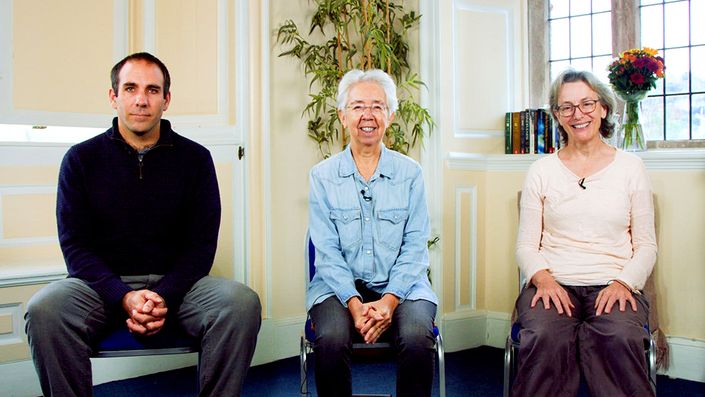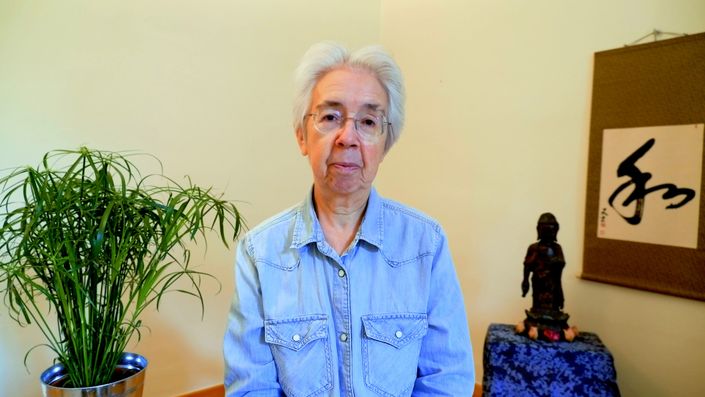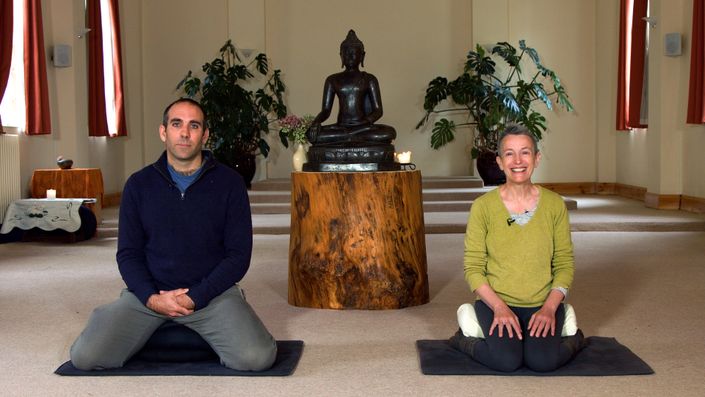The Dharma of Relationships: The Paramis in Action
Integrate Buddhist practice into your relationships.
Relate from a steadiness within
It's in our relationships that we see the progress we are making on the Buddhist path. This is where kindness, generosity, mindful speech, restraint, and a great deal of delight reveal themselves. But relationships can also be challenging. They often show us where we are stuck and so can be a great opportunity for practice.
The paramis are a series of qualities that are especially appropriate to a life lived in relationship. This online course is a journey of learning the paramis—individually at first—and ultimately combining them in creative ways to bring joy and wisdom into your relationships.

Study at your own pace
This easy-to-use online course is available to all. It comprises six units that form a program of instruction, meditation, discussion and contemplative exercises. Each unit contains around 60 minutes of material to view and practice. You are free to study at your own pace, and will retain ongoing access to the material.

What are the paramis?
The paramis are a series of special qualities, often translated as "perfections" or "the highest." These are traits that a fully enlightened buddha is said to have mastered, yet they are relatively easy to bring into our daily life with a little intentionality.
There are different lists of paramis. We have focused on seven core qualities common to the traditions.
| The seven paramis developed in this course | |
|---|---|
| Mindfulness | In this first parami, mindfulness, we're simply bringing more awareness to how we are in the dynamic of relationships. |
| Effort / Courage | It takes courage to look at our patterns and conditioning. We can also understand this as a quality of soft effort, of persistence, of interest in what's happening. We keep looking, we keep showing up with curiosity. |
| Generosity | In the parami of generosity, we're bringing in a different attitude: an attitude of open-mindedness and open-heartedness towards our patterning, towards our habits of relating. And this attitude supports us opening in the moment to where we are. It works in tandem with the first parami, mindfulness. |
| Ethics | Ethics involves exploring our foundational principles in relationship. Whatever our guiding principles may be, we act congruently with them. |
| Wisdom | Wisdom means bringing more discernment to where we take ourselves to be in relationship; more curiosity about self: who we take the self to be, who we take the other to be. It means questioning the tendency to put ourselves in boxes or freeze our ideas about ourselves and others. We bring attention to the emotional affect of these views. We build resilience amidst the challenging feelings that relationships can evoke and also appreciate the positive feelings relationships can evoke. Wisdom also includes the capacity to feel our way more fully into consciousness. |
| Patience | To inquire in this way, and to relax deeper into consciousness, we need patience. Patience is the parami that supports us to abide with our experience—a fuller connection with experience. We receive experience more fully into consciousness and listen beyond what we already know. With patience, perhaps we will find a response to a situation that's more closely aligned with what we deeply wish for in our relationships. |
| Skillful means | For the final parami, we will explore skillful means: how do we develop all of these paramis in our lives? What creative, appropriate methods will we discover for bringing them into our lives and the lives of others? |
Benefits

6 hours of video teachings
Enjoy a well-crafted curriculum with presentations, meditation, self inquiry, and daily life tasks—all designed to bring the paramis into your relationships.

Your life is the teacher
With guidance, we can see opportunities for growth and sincere practice right where we are. We don't need an ideal lifestyle to make progress. We work with what arises.

Experience greater ease in relationships
When we bring awareness and kindness to unconscious patterns of relating, we often find that a shift takes place...

Integrate your practice and your life
The Buddha said that community was the whole of the holy life. But sometimes we draw artificial lines around our practice: on retreat/off retreat; on the cushion/off the cushion. What happens when we remove these binaries?

Explore your relationship to life
We cannot always change our circumstances or the people around us, but we can change how we relate to life. As we bring the paramis into our lives, we cling less and therefore begin to suffer less.

Timeless methods
Our method is to bring mindful curiosity to our experience, and to creatively unbind ourselves from well-worn habit patterns. This is the wisdom of the Thai Forest Tradition, Burmese vipassanā, and Korean Sŏn Buddhism that we learn from Laura and Martine.
Expert guidance

Martine Batchelor
Martine lived in Korea as a Seon nun under the guidance of Master Kusan for ten years. She is the author of Meditation for Life, The Path of Compassion, Women in Korean Zen and Let Go: A Buddhist Guide to Breaking Free of Habits. She teaches meditation retreats worldwide and lives in France. Her latest works are the The Spirit of the Buddha, What is this? and The Definition, Practice and Psychology of Vedana. Recently she has been involved with the Silver Sante Study, teaching meditation, mindfulness and compassion to seniors in France to see if this could prevent age-related decline.

Laura Bridgman
Laura began meditating in her early teens and ordained as a Buddhist nun in 1995. She was resident at Amaravati and Chithurst monasteries under the guidance of her teachers Ajahn Sumedho and Ajahn Succito. Laura left the monastic tradition in 2015 and is now Staff Support Teacher at Gaia House, a retreat center in Devon, England. She has spent extended periods practicing with the Burmese teacher Sayadaw U Tejaniya. Laura taught Beyond the Inner Critic, and Embracing Impermanence and Imperfection, both Tricycle Online Courses, with Gavin Milne.
Sample: A Conversation about Dharma Practice and Family
Laura and Martine discuss walking the Buddhist path amidst family life.
Conversations
Here are the some of the topics Laura and Martine will discuss.

The teacher/student relationship
Martine and Laura discuss the benefits of the teacher/student relationship, and the importance of high ethical standards.

Solitude
What is the effect of solitude on the mind? How do we relate to ourselves when we're alone? How do we balance solitary practice and life in relationship with others?

Sexuality
How do we bring sexuality into our lives as lay practitioners in a healthy, enjoyable way? How do we practice with these energies that are perhaps the most powerful of all for many of us?

Family
Our psychological conditioning often appears most forcefully in family life. What if we could bring our path through the middle of this terrain, and remain open to what we find?

Grief
One of the great pains of relationships is that they can come to an end, sometimes unexpectedly. This can be impossibly hard but we can find wisdom in the teachings that helps.

Ending relationships
How do we know when to end a relationship? How do we set that boundary in a caring but definitive way? Sometimes we will need to do this for our own wellbeing.
Curriculum
Testimonials
Praise for Embracing Impermanence and Imperfection with Martine Batchelor, Laura Bridgman, and Gavin Milne.
This course presents profound and complex insights in a way that is easy to absorb and practice. The teachers wisdom is thoughtfully and humbly presented, providing a workable model for my own practice.
This is a beautifully taught, well structured course that gives you new perspectives and practices (off and on the cushion). It breathes new life into your relationship with impermanence, imperfection and conditionality, even if you’re a long-term practitioner..
Amazing introduction to the often challenging subject of impermanence and change. Beautifully facilitated!
Related courses
You may also be interested in these Tricycle Online Courses.





